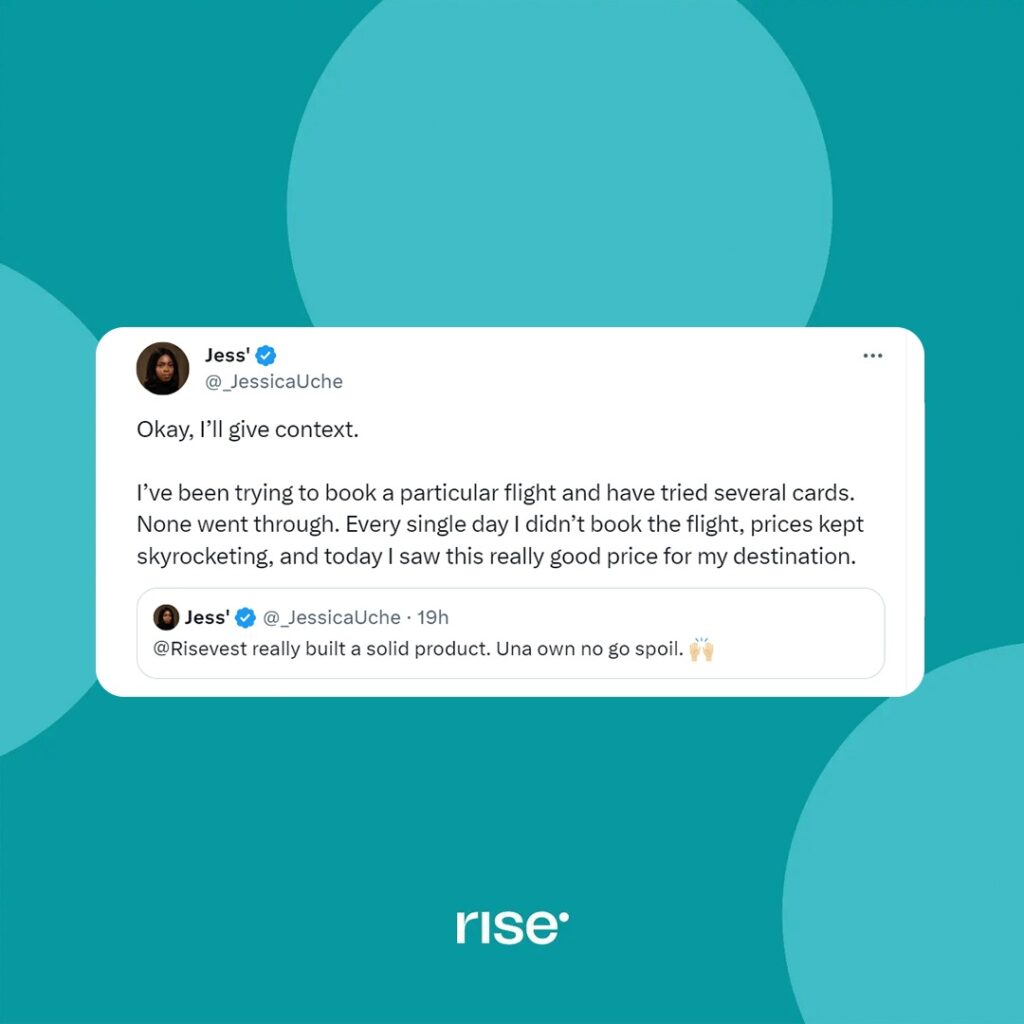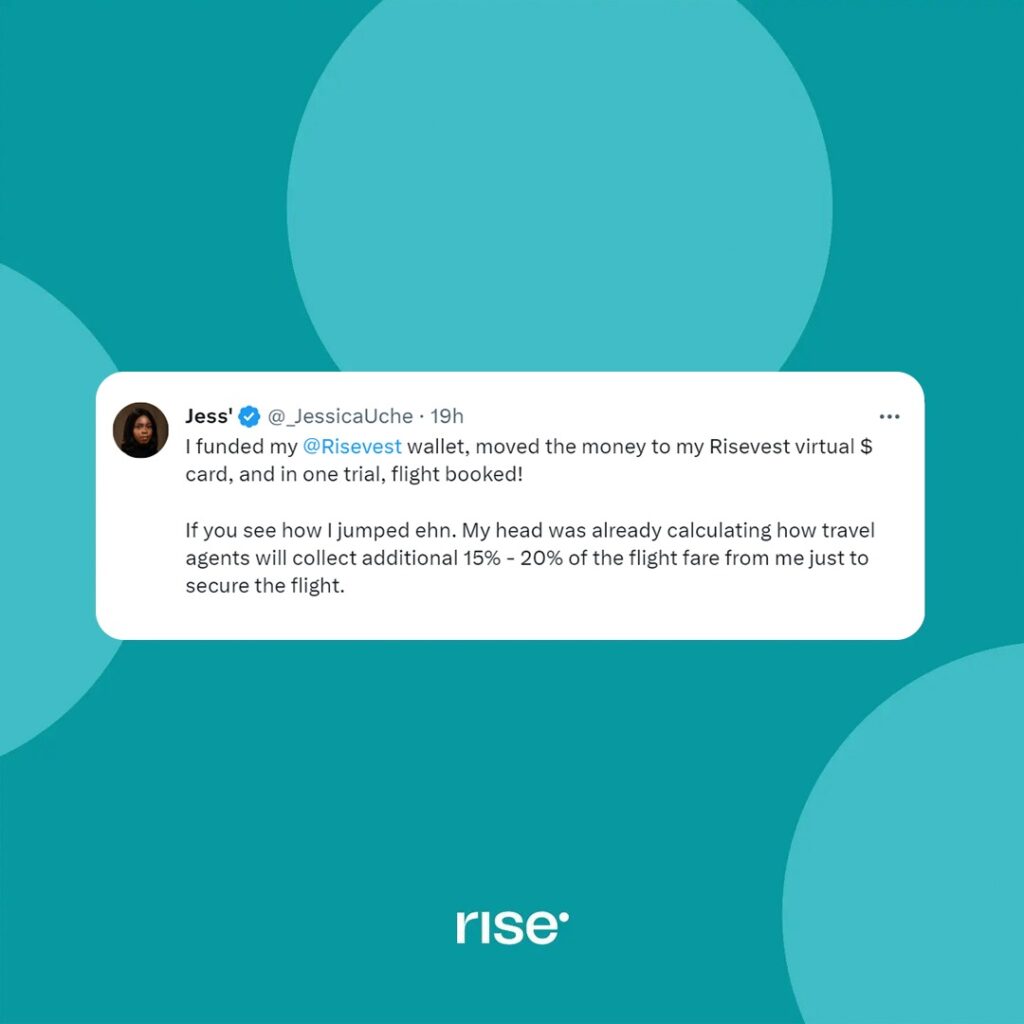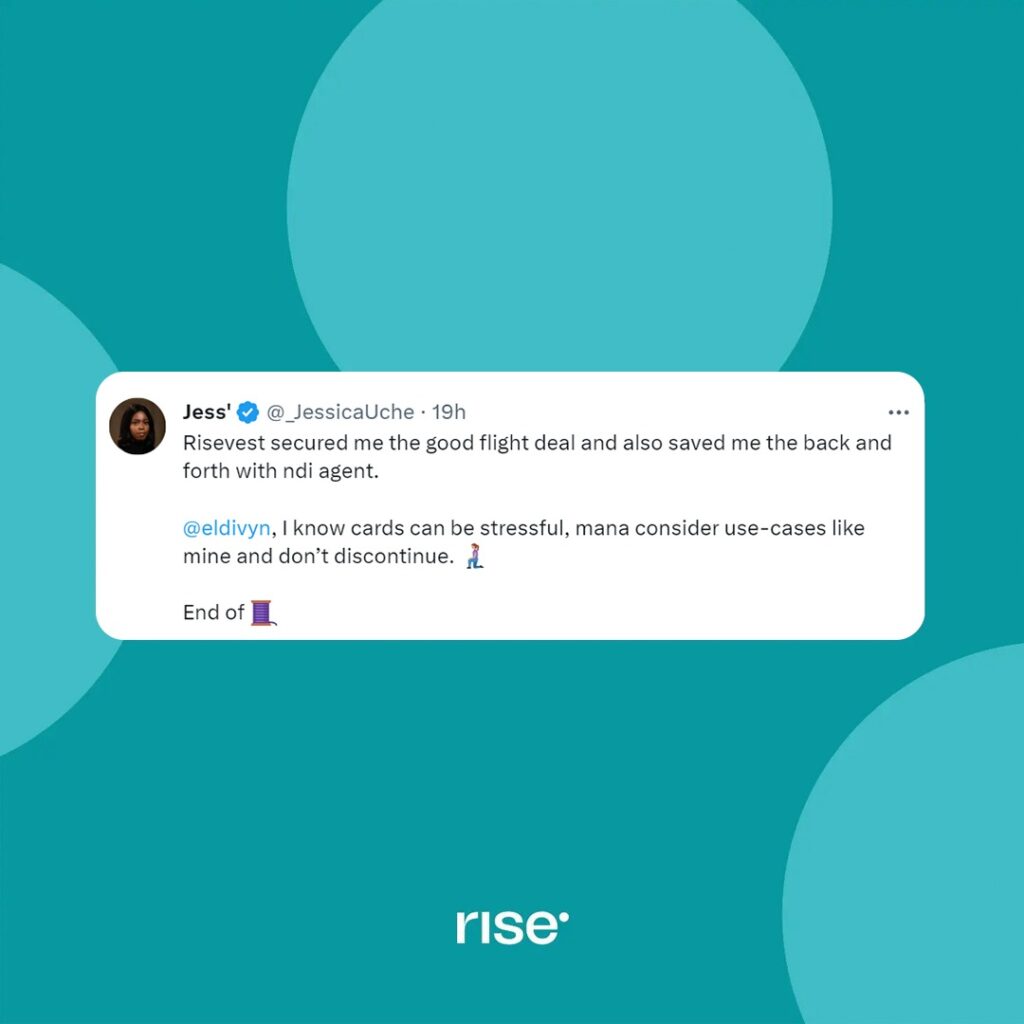In this episode of #MoneyRise User Story, we spotlight Jessica, a salesperson-turned-country director, whose first investment on Rise was $10. Three years later, Jessica can’t stop talking about and spreading the gospel of Rise. She now invests as much as 50% of her salary, uses her account statement for visa applications, virtual card for online payments and saves towards specific goals. Read her story.
Tell us a little about yourself.
My name is Jessica, but I prefer to go by Jess. I’m the Country Director for Native Teams in Nigeria. I oversee business operations here and across Africa. I like to refer to myself as a sales and partnerships person. I’m always selling something. I’m either trying to sell myself to you or my company’s products or other products that I believe are amazing. When I find value, I try to sell it to other people because I want everyone else to experience the same value. I want people to know great things that they should introduce to their lives to make it better.
That’s interesting. So why sales?
The first thing I’m going to say is that I come from the part of Nigeria known for selling. I’m from Nnewi in Anambra state, and we are known for selling. My dad was a sales and businessperson. My mum also had her business. So I didn’t grow up in a family of white-collar jobs. It was strictly business. I had to join the family business before I started mine.
How did you go from managing your parents’ businesses to getting a job in sales?
Managing their businesses taught me a lot of things which I didn’t realise at the time. I learned sales principles, like how to manage sales, keep records, manage customers and customer relations, retain customers, and give bonuses or incentives that will make customers continue to patronise you. In university, I started and managed my own cake and food business. After graduation, I got a job as a business development officer, and it was my first official sales role.
…And you’re now a Country Director for Native Teams. How did you do it?
It’s an interesting story actually. My company wanted a Business Development Manager that would also lead expansion into Nigeria, so I applied. I got the job, and was doing that and bringing in money, but my responsibilities were beyond just a BDM. I did a lot of operations, partnerships, legal work, accounting, payroll, and management. A year later, I got a promotion as a Country Director, and went from selling companies to becoming the face of the company.
How has the experience been managing a company’s expansion?
It’s a lot. Managing the process of building a product, improving on features that people like, convincing people to buy, and retaining them is a whole lot of people management. All the skills I gathered, consciously and unconsciously, have helped to keep me.
Let’s talk about money; how do you manage money?
Quite frankly, I’ve always been an anxious money person. I save so much because of the type of country we live in and the family I come from. There’s this unconscious feeling that I could go broke anytime. Hence, it’s better to keep some aside. This helps to keep me in check irrespective of what I earn. I don’t spend recklessly, and I find ways to live within or grossly below my means. For example, when I was earning N50,000, I’d save 15,000 naira every month, living on 35k. I have always believed that you don’t only save when you have big money. It’s a culture you build from when you have little.
Imbibing this saved me a lot of times, and helped to build up my savings and my saving culture. After a while, I began investing. I used to save 15k naira on a savings platform, but discovering Risevest, I started to split it. I would save 10k on the other platform, and 5k in Risevest. At the time, a dollar was about N500 or N400, so my N5k was about $10. Every month, I’d invest $10, which made me really happy. I didn’t have the cash physically but it felt good that I had foreign currency I could withdraw at any time.
Wow. How much do you invest today since you started with N5,000?
I can’t quote a figure, but I invest as much as 50% of my salary. In months I don’t have targets that I’m trying to meet, like getting myself a Macbook or buying an iPhone, I invest as much as 70%. My initial lifestyle helped to make me prudent, so I’m not a huge spender.
Apart from the fear of not losing money, what else are you investing for?
On Risevest, I’m investing for two things: one for my masters and the other is just to have dollars. However, I don’t see the one for masters as my money again. I also do a lot of target investing, like investing for a car, an apartment, business, and travel. So anytime you see me travel, just know I had saved for it four or five months before. I set targets. When my salary comes in, I split everything between my targets.
You’re doing amazing! Now, let’s talk about your journey on Rise. How did you start? And how has the experience been so far?
I first heard about Risevest on Twitter. I also have a friend in the UK, Jenny, who constantly talks about Risevest. I had never received dollars before, so when she said I could have and even invest in dollars in Nigeria, I got interested. I read up on it, and learned that I simply just had to deposit naira and have it converted to dollars. I loved that I could deposit via bank transfer on my card. I’d fund 5,000 naira, and it’d become $10 or $10.03 or $10.06, depending on the dollar/naira rate at the time. I started this journey in late 2020 when I was earning N50,000. When my salary increased the next year in January to N80,000, I started investing N10,000 which was about $20 at the time. For every new role I got, my salary increased, as well as my savings and investments.
Just to add, I’m not a high risk investor, so I started with fixed income. To me, it wasn’t about generating returns, but about the safety of the money. I just wanted to know that if I put $10 away, I’d come back to meet the $10. I started like this until things got better, then I moved to medium risk which is the real estate plan.

That’s really nice. So what other ways has Risevest helped your financial journey?
When I began using Rise, it was basically to save dollars. Now, I use it to invest towards my goals so that the value of my money does not depreciate and to diversify my investments. Also, the recent introduction of virtual cards is a very good thing for me because it saves me the stress of having to use other card-providing platforms. Instead use my dollars on Rise. When I need to make a dollar payment, initially I would have to withdraw money and put it somewhere, create a card, and make payment. But now, I simply transfer money from my Rise wallet into my Rise virtual card and make my purchase. Whatever is left, I move it back to the wallet or to an investment plan to be earning interest. It makes things easier for me such that it’s simply one less app I have to open to do stuff. It merges everything into one. That’s a brilliant feature and I’m super grateful that you guys introduced it.

Tell us more
Oh, yes! Account statements too. Rise is doing an amazing work with that too. People may not realise it, but you can use your account statement to get loans or as proof of funds for Visa applications. I’ve used the Risevest statement of account as proof of funds and I got my Visa. I think countries want to see that you earn in NGN but that you also have additional investments. It shows the person reviewing your Visa that you have FX invested towards your goal, giving you more credibility.

You’re truly a salesperson, Jessica. If I wasn’t a Rise employee and user, I’d have been sold. So on a scale of 1 to 10, how likely are you to recommend Risevest to new users?
Is this a joke? I recommend Risevest to people every single time and will keep recommending it. So the answer to your question is 10. Aside from the investment benefits, Rise’s customer service is amazing. I can always send a DM on Twitter and get a quick response. Both the product and customer management is a 10. That’s how good you guys are.